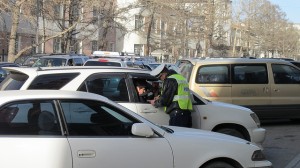 The issuance of speeding tickets is not entirely uncommon in California and that’s why many motorists assume that speeding penalties are likewise relatively limited. Even though penalties can vary state-by-state, in general, there is a sliding scale for fines that is based on the actual speed over and above the speed limit at which a particular driver was traveling. However, this bit of conventional wisdom does not always hold true, and there are situations where a driver going over the limit and receiving a speeding ticket can result in some amount of jail time.
The issuance of speeding tickets is not entirely uncommon in California and that’s why many motorists assume that speeding penalties are likewise relatively limited. Even though penalties can vary state-by-state, in general, there is a sliding scale for fines that is based on the actual speed over and above the speed limit at which a particular driver was traveling. However, this bit of conventional wisdom does not always hold true, and there are situations where a driver going over the limit and receiving a speeding ticket can result in some amount of jail time.
The difference between paying a bothersome fine and spending at least a night in jail is affected by a number of different factors discussed below.
How Are Penalties Determined In The First Place?
Before getting into the risk of harsher penalties for speeding tickets, it will be helpful to examine how speeding violations are typically viewed.
- For most states, traffic violations are classified as either minor or major violations.
- Minor violations are offenses that many people may commit either by accident or due to negligence, such as most speeding tickets or going through a red light too late and being caught by either an officer or an intersection camera.
- Minor offenses may result in points on an individual’s license (based on the state scale) and a fine.
In many states, once an individual has accumulated a certain amount of points within a set time period (for instance, five years), they may be subject to a license suspension or stronger fines.
- These minor driving offenses fall in contrast to major offenses, such as reckless driving or driving under the influence.
- Major traffic offenses have accordingly more serious penalties, such community service requirements or jail time in addition to a heftier fine.
These major offenses will also require a court date, as opposed to minor offenses which often simply require paying a fine.
Can A Speeding Ticket Mean Jail Time?
In most situations, speeding is a minor traffic violation and thus does not usually result in jail time. However, there are a set of situations where this harsher penalty can still occur.
- In some states, driving over a certain speed (set in some states at 100mph or 120mph) is considered reckless driving, and thus may be a major offense that includes jail time as a penalty.
- If a driver accumulates a high number of speeding tickets, the penalties will increase in severity and may eventually result in jail time.
- If an individual has been required to appear in court due to the severity of their traffic offense but fails to show up, the judge will likely require this person to be arrested and sent to jail.
- Some states also have harsher penalties when driving in areas such as work zones or school zones, and going over a certain speed within these areas can mean higher fines and jail time as part of the penalty instead of the standard fine requirements.
- Finally, speeding in conjunction with other offenses – such as driving under the influence – can almost certainly mean jail time.
To conclude, a simple speeding ticket does not result in an individual having to serve time in jail in most instances. Rather, jail time for speeding violations is typically used only as a penalty for infractions that are considered particularly severe, such as repeat offenses, speeding in areas where it is considered particularly dangerous, and going so fast that the infraction is upgraded to reckless driving and considered to be a major infraction. In these situations that may result in jail time, an individual will most likely require legal representation to manage their court proceedings.
[Image: https://www.flickr.com/photos/itdp/5666348378]
Scott Desind
Latest posts by Scott Desind (see all)
- How to Request the County Seat and Fight Your California Traffic Ticket - May 21, 2023
- Don’t Even Touch That Cell Phone - July 13, 2022
- Innocent Until Proven Guilty - March 2, 2020

